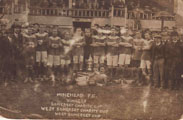
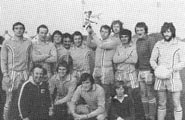
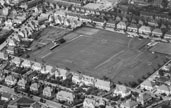
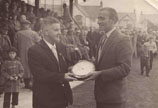

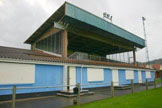
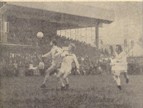
| Home |
| News |
| Fixtures & Results |
| Reports |
| League Table |
| History |
| Sponsorship |
| Events |
| Club Calendar |
| Club Shop |
| Programmes |
| Downloads |
| Contact Us |
HISTORY ( Last Updated on 22/07/14 )
Minehead Association Football Club was originally founded in 1889 and spent their early years in local competitions. They entered the Western League at the start of the 1924/25 season, but after Division 2 had diminished to just 8 clubs returned to the Somerset Senior League for 1928/29, remaining in the league until WWII. After the hostilities the club enjoyed success in firstly the North Devon Senior League, followed by the East Devon and Exeter League, returning to the Western League ranks for the 1949/50 season.
The club turned semi-professional in 1950/51 under former Exeter City captain Steve Walker, and in the late fifties became one of the strongest forces in the league under the guidance of Bristol based Ron Gingell. Though they remained in the Western League for 23 seasons, in spite of being one of the most consistent teams in the league, Minehead never actually won the Western League Championship, although they finished as runners-up twice (in 66/67 and 71/72).
They joined the Southern League in 1972, finishing 5th in Division One (South). The following season saw them improve slightly by finishing 4th, followed by 3rd in 74/75. In the 75/76 season the club improved yet again to carry off the league title as champions, plus winning the Southern League Merit Cup by scoring more goals than any other club in the competition (all 3 divisions). Andy Leitch lead the charge with 36 goals, (the highest tally recorded while Minehead were a Southern League side), closely followed by Jimmy Jenkins and Derek Bryant who both managed 30. The next season, the most successful in it's roller-coaster history, saw Minehead finish as runners-up to Wimbledon, as well as reaching the 2nd Round Proper of the FA Cup for the first time, when they were beaten 2-1 by Portsmouth at Fratten Park, witnessed by more than 16,000 spectators.
At this stage the clubwere considered to be amongst the top 6 non league clubs in the country, reflected by being invited to represent England in the Non League Anglo-Italian Cup competition during 1978. Having won both matches at home, Minehead lost both return matches in Italy, one of which was against Udinese. Within a few short years Udinese had progressed through to the Italian 1st Division, with their ground being chosen as a venue for the World Cup finals in 1990.
More history wascreated the following season when striker Andy Leitch found his name in the record books by scoring in 6 consecutive FA Cup matches, equalling Jeff Astle's record. Leitch had a scorching header hooked off the line with the keeper beaten during Minehead's 2nd Round Proper tie at home to Exeter City, which would have given him the record outright. Minehead were beaten 3-0 by the Devon club, a tie which attracted the club's second highest home attendance of 3,050. Though the club were still a cup force to be reckoned with, their stunning strike partnership of Leitch, Jenkins and Bryant parted company. Struggling to score goals they were relegated from the Southern League Premier Division, finishing 17th of 20, just one point from safety. However the name had been put firmly on the non league map. On the occasion of the Southern League's centenary year (1994) manager Bob Boyd was chosen as one of the top one hundred managers in it's history, where his name stands proudly alongside such names as Malcolm Allison, Ron Atkinson and Barry Fry. The 79/80 season saw are structuring of the non-league pyramid, with the “creation” of the Alliance Premier League (now the Conference League).
The Southern League, losing 13 clubs in the switch, opted for a Midland/Southern divide. Minehead competed in the Midland Division, and after leading the division from January, finally finished as runners-up to Bridgend. Season 80/81 saw them finish 12th, however the club were starting to experience financial problems, and the decision was made towithdraw from the Southern League at the end of the 82/83 campaign.
Back in the Western League, the team were brought back to reality with an 8-0 thrashing at Frome Town on the opening Saturday of the new season. Relegated to the First Division in 1989, the following year saw things get progressively worse, finishing bottom of the lower league. With no relegation that season, the blues lived to fight again, and the following season manager Andy Hodgson led a locally based team to the First Division Championship, gaining a record number of points. Teenage striker Gareth Morgan scoring 44 times in 40 appearances,which remains a Western League record for the club.
Further off the pitch problems soon hit the club and in the 93/94 season with 6 points being deducted the side were relegated again, staying in the First Division until 98/99 when they won the championship. Their only league defeat came in the final match, away to neighbours Ilfracombe, having been presented with the trophy several games earlier. The high point of this season again being a lethal strike partnership, this time between Nick Woon, Gareth Morgan and Jason Charlesworth. All three appearing in the Western League’s top six scorers, with over 30 goals each. On their arrival back in the Premier Division finances had dried up, with many of the successful team moving on. Woon stayed, and was again amongst the top scorers in the league, however his goals alone could not prevent the side finishing bottom, avoiding relegation due to a restructuring of the league.
The club were relegated the following season however, and languished near the bottom of the First Division ever since. At the end of the 2009-10 season the club finished ten points adrift at the bottom of the table, and having flirted with relegation for several seasons were relegated into the Errea Somerset County League Premier Division. Robbie Hopkins remains in charge with Paul Newbold as his assistant as the club looks to re-establish itself and to build again for the future.
|
 |
 |
 |
 |
 |
 |
 |
 |
 |
 |
 |
David Hurley |
 |
 |
 |
 |
 |
 |
 |
 |
 |
 |


